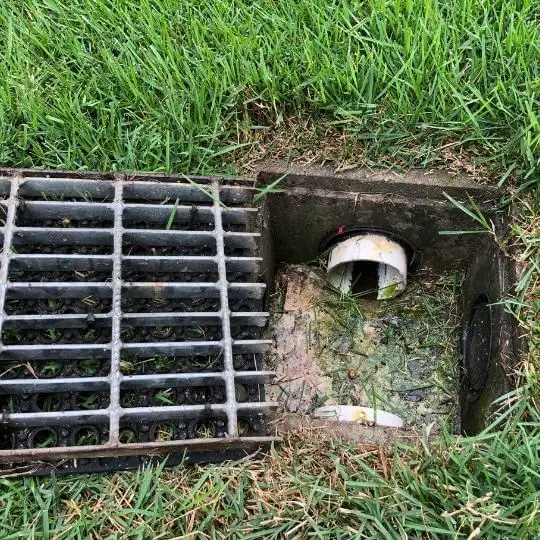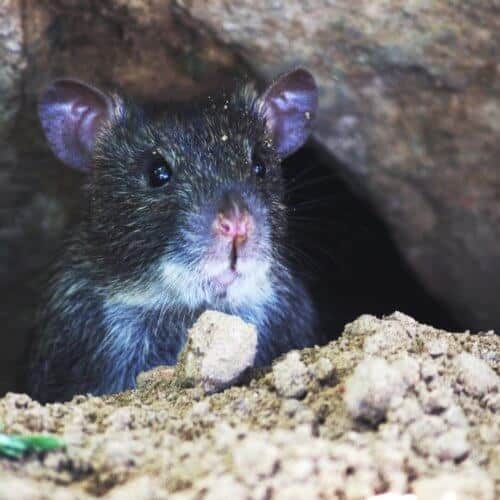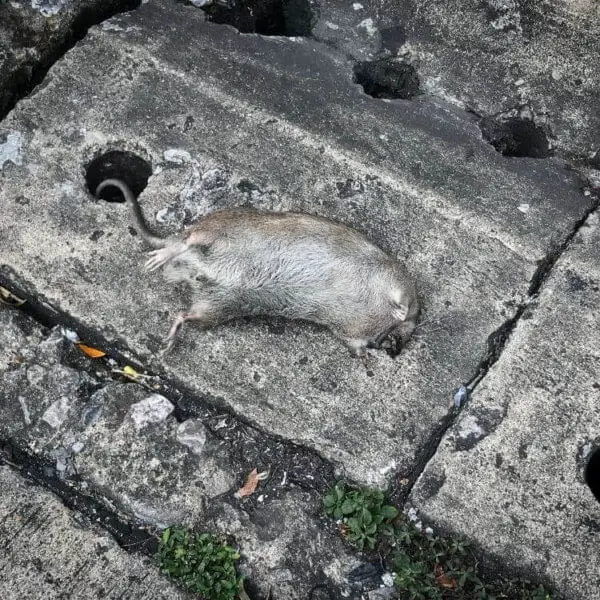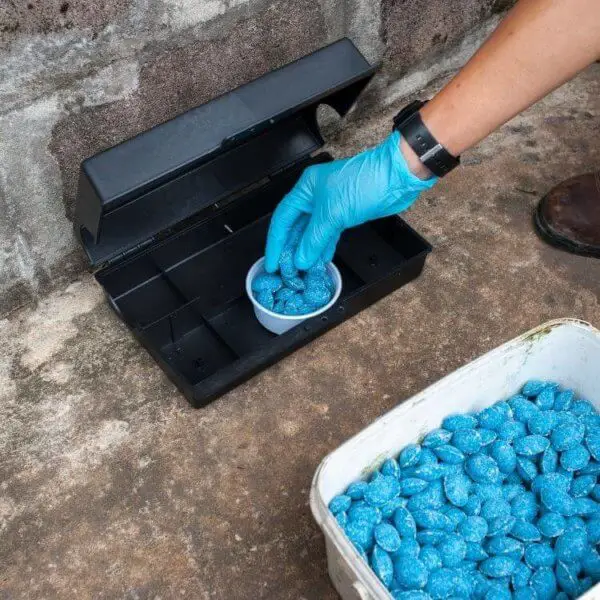You have just put the finishing touches on your house remodelling project. Now your house is all spick and span after refitting it with the new PEX pipe installation. But you are not yet at peace. You have heard about rats’ attraction to PEX pipes. But can rats chew through PEX pipes? You are not alone.
Millions of people who have embraced the PEX pipe technology are also worried about the danger posed by rodents to their pipe systems. The last thing you would want is for the water pipes to leak all over the place because a rat or mouse got to them.
Can Rats Chew Through PEX Pipes?

Yes. Rats can chew through PEX pipes.
In fact, rats can chew through anything softer than their teeth. Dr. Bobby Corrigan, a famous rodentologist from New York University, discovered that a rat’s front teeth (incisors) are harder than copper, platinum, or iron [1].
When measured in terms of the Mohs hardness scale, rat incisors were found to rank at 5.5 while diamond ranks at 10 [2].
This implies that PEX pipes cannot hold up against rat teeth. Rats can chew through PEX pipe because it is malleable. Malleability refers to the property of an object whereby it can be worked into different shapes without breaking.
What are PEX pipes?

PEX pipes are manufactured from cross-linked polyethylene (PEX). The pipes are mainly used in household water supply systems. PEX pipes are so popular that they are quickly replacing copper as water pipes in households around the world [3]. They have two main advantages: PEX is cheaper and the pipes are easier to install than copper. By estimation, installing PEX pipes has been shown to can save up to 60 percent of project costs [4].
In particular, PEX tubing is flexible, which makes it easier to fit through tiny wall spaces. However, PEX pipes have demerits too. The main disadvantage is their susceptibility to attack by rodents, which find it easier to chew as compared to copper or galvanised steel pipes.
Why do rats chew on water pipes?

While experts are yet to agree on why rats and mice chew through water pipes, few possible explanations have been given for why this is so. Some suggest that the plastic used in the manufacture of PEX tubing has an appealing scent to rodents. Some plastic types like grocery bags are manufactured from fish oil, which makes them attractive to rats.
Additionally, the answer to the question can rats chew through PEX pipes is explained by the fact that such a pipe is thinner than its galvanised steel or copper counterparts. According to this argument, thirsty rodents can easily hear water flowing in such pipes. In instances where rodents ingest poison, they become dehydrated and, in their rush to get water, chew through the PEX pipes to find it.
Rodents such as mice, rats, and squirrels have teeth that grow constantly. To keep the teeth from growing out of control, they have to keep gnawing and chewing on stuff.
There have been reported cases where such overgrown teeth have penetrated the animal’s skull and killed it. This explains why rats chew through PEX pipes. And it could be that the pipes are easily accessible to them. PEX pipes might present an easier target for the rat to chew than steel or copper pipes.
The danger posed by rats and rodents to homes
Rats eating through PEX pipes spell doom for the homeowner. Chewing through PEX piping that carries water can cause flooding and damage to household appliances. Where the holes in the pipes are small, the gradual leak may lead to the accumulation of toxic mould and rotting of wooden beams if not discovered and stopped in time.
The damage can become so extensive that it may put a significant dent in your finances when you try to fix it. And flooding and mould are not the only dangers you have to worry about when dealing with rats chewing through PEX piping either. Rodents have been known to start house fires by chewing through electrical installations
Where wood beams, insulation, or other flammable material are close to electrical installations, they easily catch fire when exposed to the naked wiring. In the interest of protecting your house from such risks, it is important to prevent rodents from chewing through your PEX piping and electrical installations.
How to Protect your PEX Pipes from Rodents

Now that we have answered the question can rats chew through PEX pipes in the affirmative, it is important to take action to safeguard your pipe system from such an eventuality. Timely detection and elimination of rat infestation before it spins out of control will guarantee that your PEX pipes serve you well for long. Here are some helpful ways to go about it.
- Make early detection a priority
The best protection for your PEX pipe system against rodent attacks hinges on detecting infestation before it becomes worse. You can easily locate areas of mice and rat activity around your house by carrying out regular inspections.
Rat activity is marked by their droppings in areas where they frequent. Scratching noises in the attic or the ceiling might also indicate that you have a rat problem on your hands. Once rodent activity has been identified, it can be dealt with quickly before it turns into a full-blown nightmare.
- Getting rid of existing rats
Perhaps by the time you take notice, rats have already moved in and made themselves at home. This means implementing measures that will get rid of them. Getting rid of rodents can be done in several ways. A few of these are outlined below.
- Poisoning: Poisoning is one of the ways of getting rid of rats that could destroy PEX pipes. This involves baiting them with food laced with poison. Once they eat the food, they die. This method, however, has some drawbacks. For one, the rat may die in a place inside the house that is inaccessible, making it difficult to dispose of it. And once the dead rat starts to rot, the house is engulfed in a foul smell, rendering it uncomfortable to live in. Additionally, poisoning rats causes them to be dehydrated, which makes them desperate for water. The water supply pipes will therefore be at risk of being chewed, especially if they are of the PEX variety. This makes poisoning as a method of protecting PEX pipes from chewing by rats counterproductive.
- Use of mouse traps: Traps are a better alternative to poison. Traps work better in that they kill the rodent instantly. The traps are placed at potential entry points to the house. Once the rodents have been captured and killed, they can then be disposed of start rotting and filling the house with a bad smell.
- Make use of Natural Repellents: Use of natural repellents is a great way to keep your house rodent-free and your PEX pipes safe. Some prefer this as the more humane approach to dealing with the rat problem. Some of the natural repellents used include peppermint oil, mothballs, ammonia, steel wool, cayenne pepper, among many others. Peppermint oil is the most common natural rodent repellent. Since rodents dislike its smell, peppermint oil can be strategically placed around the house to repel them. Mothballs, on the other hand, contain naphthalene, a substance known to repel rodents if used in high concentration doses. Because ammonia mimics the scent of a predator’s urine, it can be used effectively to repel rats. When rats encounter this scent, they will run away from the fear of being eaten. Steel wool is used for blocking rodent entry points into the house while cayenne pepper contains a strong scent that naturally repels rodents Find out more about getting rid of rats in sewer pipes here.
- Fixing rat damage to PEX pipes
In some cases, you may not be able to prevent rats from getting to the PEX pipes and damaging them. Or you may have been too late in detecting and getting rid of the rats before they got to the plumbing. In such instances, the only option is to fix the damage. You may need to repair or, if the destruction was extensive, replace the damaged part.
Fortunately, the flexible nature of PEX pipes means that you can easily access the damaged part to salvage or swap it with a better one. You may need the help of an expert, in this case, to ensure that the repair is done properly. Repair even the smallest leak immediately before the damage spreads and becomes extensive.
Preventive Measures for Rodent Control

Prevention is always better than cure. This is as true for rodent control as it is for medicine. Preventing rodents from getting into your home in the first place is the best strategy for safeguarding your PEX piping system.
The good news is that it does not need to break your bank to secure your home against a rodent infestation. All it takes is a heightened form of vigilance to keep the pests away. This is accomplished by blocking rodent entryways and keeping the home clean.
- Seal off rodent entryways
Rodents don’t need a lot of space to wiggle through to your home. The smallest hole the size of a dime can easily admit a rat. Rodents such as rats are known to have flexible rib cages, which enables them to squeeze through very small openings. You will need to locate and block off any opening that could admit such unwanted visitors into your house.
Inspect your house to discover potential holes and seal them tightly. Areas like the basement and attic, gaps around the sewer drain, and vent pipes should be sealed with a rodent-proof sealant.
- Keep house clean
Another way to keep rodents away from your home is to maintain a clean environment within and around your house. Keep the kitchen and toilet sinks clean and free of debris. Ensure that your compound is free of the clutter that could encourage nesting by rodents.
Garbage should be disposed of immediately because it provides a breeding ground for rodents. Similarly, keep all uncooked food in tightly closed containers while food leftovers should always be refrigerated. These steps eliminate the possibility of rats finding ground to stay in your house.
- Mouse proofing pipes
PEX pipes can be insulated against a chewing attack from rodents. Mouse proofing pipes entails covering them with a substance that will either prevent exposure to attack or repel the rodent.
Substances like anti-rodent tapes, repellents, foam, dry ice, aluminium foil, or ivory dishwasher soap can be used as effective mouse proofing for PEX pipes. These offer temporary insulation and might need to be reapplied from time to time.
For more permanent protection, you might want to consider solutions like mesh insulation screens, hemp, fibreglass, and cellulose insulations. PEX rodent sleeves can also be used to protect pipes. This is where the PEX pipe is covered (sleeved) with a poly piping that is crack resistant to prevent rodents from accessing it.
Can Rats Chew Through PEX Pipes – Final Word
Rats and other rodents can be a nuisance particularly in rural setups where they move freely between fields and households. Because PEX pipes are smaller in size and thinner than other pipes, they are more susceptible to chewing by rats.
PEX pipes that have been chewed through can cause damage to the house, including flooding, fires, and the associated dangers.
It is necessary, therefore, that appropriate action is taken to protect such pipes from damage and, where chewing has already occurred, repair or replacement is done to prevent further damage.
Although remedial action like extermination can work in getting rid of rodents, it is much more efficient to implement preventive measures like maintaining a clean house and insulating your PEX piping installations. These methods yield better results and last longer, not to mention their Eco-friendliness.

Michael Davis is a heating & plumbing expert who currently works as independent contractor in SC. He also writes for Plumbertip.
For almost 10 years he worked on various plumbing tasks across South Carolina.



